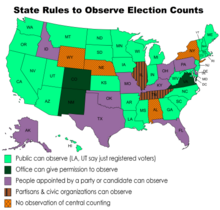Counting agent
The examples and perspective in this article may not represent a worldwide view of the subject. (May 2011) |

A counting agent or count agent is a type of electoral observer and may be self-nominated,[1] appointed by either the candidate standing for election or the candidate's election agent to oversee the counting at the election count.
In the United Kingdom there is no legal requirement to appoint a counting agent.[2][3] At elections in the Republic of Ireland, counting agents are called tallymen; they keep track not only of first-preference votes but also of transfers.[4]
The number of counting agents which can be appointed is determined by the returning officer of the election and is usually dependent on the number of counting clerks at the count. Counting agents are appointed after the period when nominations to the election are made. The election timetable will state when counting agents have to be appointed, typically a week before polling day.
The role of the counting agent is to oversee the count itself, though they may not touch any of the ballot papers and must act through the returning officer.
UK counting agents must follow a code of practice.[5]
In the United States, absentee ballots are usually counted at a central location, not the polling place. Rules on who may observe the counting vary by state.[6]
See also
[edit]References
[edit]- ^ "Electoral Administration Act 2006". Retrieved 20 November 2022.
- ^ "Guidance for candidates and agents - Your right to attend key electoral events" (PDF). Electoral Commission. November 2018. Retrieved 26 April 2019.
- ^ "The count" (PDF). Electoral Commission (United Kingdom). Archived from the original (PDF) on 2 August 2011.
- ^ Regan, Mary (6 June 2009). "Art of the tallyman returns to centre stage at vote counts". Irish Examiner. Retrieved 1 June 2013.
- ^ "Electoral observation at United Kingdom elections and referendums Code of practice for electoral observers" (PDF). The Electoral Commission. Retrieved 20 November 2022.
- ^ "Policies for Election Observers". www.ncsl.org. Retrieved 16 September 2023.
External links
[edit]
